Table of Contents
The pomegranate may not be your first fruit choice but think again. Its health benefits and mystique go back to ancient times. Usually, people eat pomegranate seeds, but you can also drink pomegranate juice. Pomegranate extract is often used in medical applications.
We take a look at traditional uses over the centuries and 15 modern scientific findings. Find out more about this wonderful fruit, how to prepare it, and its numerous culinary uses.
Interesting pomegranate facts
The name ‘pomegranate’ comes from the Latin word for apple and seeds! Its scientific name, Punica granatum, also means’ seedy apple’ whereas granatum actually means ‘grainy’ (1).
People have grown and eaten pomegranate fruit for over 4000 years. To ancient peoples, the pomegranate symbolized good luck, abundance, and fertility (2).
This arcane fruit is native to Iran and Afghanistan. It has different names around the world, and the size, color, seed hardness, and juice content varies accordingly (3).
Pomegranate nutrition
Pomegranates are not the easiest of fruits to eat, nor the sweetest. They are crunchy, sweet yet tarty and juicy like cherries. The edible seeds are 10% of the fruit, and the edible arils, or flesh protecting the seeds, are 40% (4, 5).
Even though most fruits are fiber-rich, the pomegranate can provide a whopping 40% of your fiber-recommended daily value (DV). Fiber helps smooth digestion and reduce the risk of constipation (6).
According to the USDA, the arils in one medium (282 g) fruit contains (7):
- Calories: 234 kcal
- Carbs: 52.7 g (19% DV)
- Sugars: 38.6 g
- Fiber: 11.3 g (40% DV)
- Protein: 4.7 g (9% DV)
- Fat: 3.3 g (4% DV)
- Cholesterol: 0 milligrams
With its low calorie and fat count together with fiber, pomegranate is a good choice for weight-watchers. It is better to eat the fleshy seeds than to drink bottled pomegranate juice because of more fiber and essential nutrients (8).
Surprising mineral content
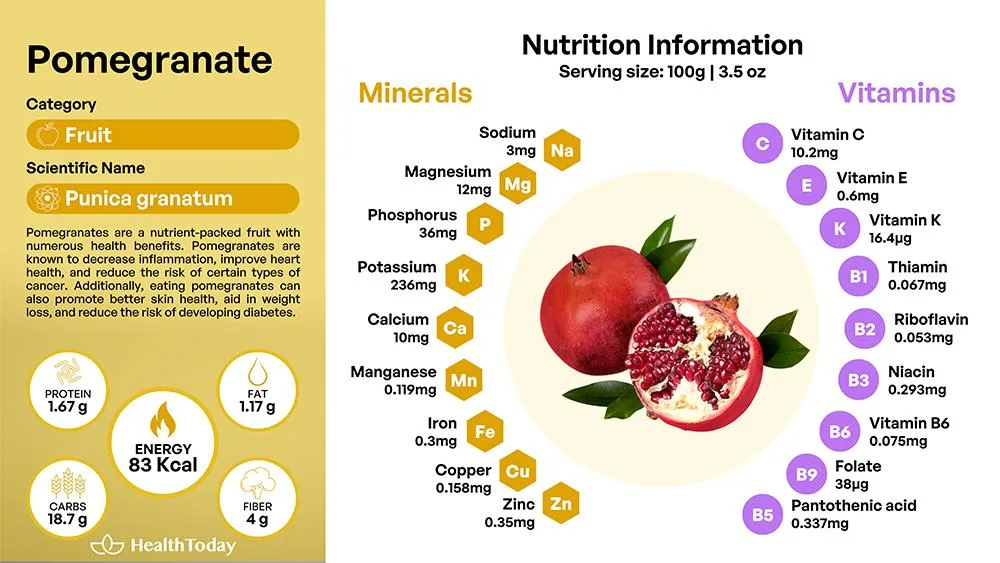
Healthy minerals are surprisingly plentiful in the pomegranate. Here’s a list of mineral content from an average (282 g) fruit (9):
- 50% DV copper – keeps your blood, nerves, and bones healthy (10).
- 15% DV manganese – improves your bone, liver, and brain health (11).
- 14% DV potassium – supports your kidneys, bones, and heart function (12).
- 11% DV zinc – supports your immune system and healthy growth (13).
Pomegranates also contain small amounts of iron, magnesium, and phosphorus, which can help prevent anemia and inflammation.
Nutrient-rich in Vitamin K and E
Vitamins are, of course, essential for numerous bodily functions. Most fruits are a source of vitamin C, but pomegranates are an additional hit for vitamin K, like kiwi fruits, and have vitamin E content similar to mangoes.
Here’s what you can find in just a medium-sized (282 g) fruit (9):
- 39% DV vitamin K – helps with blood clotting and bone building (14).
- 32% DV vitamin C – a powerful antioxidant protecting your immunity (15).
- 27% DV vitamin B9 – helps with DNA synthesis and metabolism (16).
- 11% DV vitamin E – important for modulating immune function (17).
Beyond these typical values, pomegranates also have 17 kinds of amino acids and a lot of other highly beneficial nutrients (18).
Abundant antioxidant properties
Pomegranates are fantastic sources of antioxidants, especially compared to other berry species—pomegranates are a berry fruit (19).
Punicalagin, a type of ellagitannin, is an important antioxidant in pomegranate juice. It comprises more than half of the juice’s antioxidants and has anti-cancer benefits. Other ellagitannins may help combat inflammation (20, 21).
The fruit and juice’s vibrant color comes from the antioxidant pigments anthocyanins (22). Vitamins C and E, copper, and zinc also contribute to pomegranate’s antioxidant activity (9, 23).
It’s not always clear which specific compounds reduce oxidative stress since some work better when combined. For instance, quercetin and ellagic acid, found in pomegranates, support each other to prevent cancer cells from growing (24).
Interestingly, pomegranate peel extract and seed powder can be used in food products as a preservative. They function as preservatives because they have both antioxidant activity and antibacterial properties (25, 26).
There are many benefits of pomegranate fruit. They’re particularly rich in fiber and antioxidants while low in calories and fat. Additionally, they contain important minerals like copper and manganese, as well as vitamins such as K and E. Punicalagin is an important antioxidant in pomegranate juice.
Pomegranate mystique in traditional medicine
Ancient writings describe the pomegranate as a ‘fruit of paradise.’ They believed it promoted fertility, well-being, abundance, and luck (24, 27).
Pomegranates in ancient Greece and Egypt
Documented usage of pomegranate dates back to around 1550 BCE in the Ebers Papyrus (28). It was used to cure tape-worms in Egypt and aid in digestion in Greece (29).
Pomegranates in the Near East and Persia
The Greco-Arab medical system used pomegranate root and bark to treat cough, chest pain, diarrhea, and bile disorders (27).
Way back in the Quran and Islamic tradition, it was used as a remedy for jaundice, spleen disorders, heart choking, and intense cough. It was also believed to improve the voice and cleanse the face (27).
In traditional Persian medicine, people ate pomegranate to treat headaches (30). The whole fruit has also been used for heart health (31).
Pomegranate in Ayurvedic and Chinese medicine
In the Ayurvedic system of medicine, all parts of the fruit are used for remedies. Ancient India used dried pomegranate peel extract, bark, and flower infusions to treat diarrhea, intestinal worms, nasal bleeding, and ulcers (32).
Traditional Chinese medicine uses pomegranate peel to treat diarrhea, stop bleeding, and expel worms. Mongolian and Tibetan medicine also used it to treat dyspepsia and anorexia (27).
Pomegranates have a long history of use in traditional folk medicine from across the world and in ancient times. They were mainly used to treat diarrhea, intestinal worms, and heart disorders. Because of their many benefits and numerous seeds, the pomegranate also held symbolic meaning.
15 Pomegranate health benefits: Unlocked by science
In addition to its acclaim across the ancient world, modern science is now proving the pomegranate’s potential health benefits for cancer, heart disease, diabetes, bacterial infections, and skin damage (33, 34).
1. Improved cognitive function
An animal study showed that punicalagin, an ellagitannin in pomegranate, can improve memory and brain power by fighting neuroinflammation (35).
Also, other ellagitannins in pomegranates produce urolithin-A in the gut. This compound can lower inflammation in the brain and may slow the development of cognitive diseases (36).
A small human-based study found that extracted polyphenols, equivalent to 230 ml of pomegranate juice, taken once a day improved stroke recovery (37).
Similarly, heart patients who took pomegranate extract before and after surgery had less impaired memory in post-surgical recovery. They also improved memory retention for six weeks afterward (38).
Finally, another study showed that drinking 230 ml of pomegranate juice daily for a year helped maintain visual learning ability (39).
2. Reduced risk of diabetes
Eating pomegranates may lower the risk of diabetes and improve blood sugar control in diabetic patients (34, 39).
Furthermore, pomegranate ellagitannins in simulated studies have been shown to lower starch absorption, which could reduce high blood sugar levels after meals (40).
In more promising studies, polyphenols in pomegranate juice can slow down sugar processing after a meal in healthy subjects, leading to lower blood sugar levels (41).
3. Fight inflammation
Eating pomegranates can help prevent chronic inflammation, which could lead to chronic diseases such as cardiovascular disease and irritable bowel disease (39), though larger clinical trials are still needed. Other studies have shown that consuming pomegranate juice can reduce inflammation markers in the body (42, 43).
In lab and non-human studies, it appears that pomegranate punicalagins are responsible for most of the fruit’s anti-inflammatory activity (44, 45). However, pomegranate’s effects on inflammation are not fully understood.
4. Enhanced digestive health
Pomegranate is rich in fiber. Good fiber intake can help with constipation, gastroesophageal reflux disease, and colon inflammation (46).
Pomegranate ellagitannins turn into ellagic acid in your gut. Your colon’s microbiota changes this to urolithin A and B (36). In studies with fecal bacteria, urolithin can support good bacteria like Lactobacillus spp. This is called the ‘prebiotic effect’ (47).
If you have gastrointestinal issues like inflammatory bowel disease (IBD), pomegranate might be able to help (48). Also, consuming pomegranate may inhibit the growth of harmful bacteria and fungi (24).
Pomegranate seems to be a pretty sweet deal for your digestive health. But we still need more research to understand its full effect on your gut.
5. Pomegranate and weight loss
In a study, obese people with type 2 diabetes were asked to drink pomegranate juice for eight weeks. It helped them lose weight and slim down their waist and hips (49).
Pomegranate arils contain ellagic acid and punicalagin, which can help you lose weight by preventing fat accumulation and reducing the production of fat in fat cells (50).
Furthermore, pomegranate can reduce total and LDL (bad) cholesterol levels and raise your HDL (good) cholesterol levels (51, 52
6. Improved dental health
Pomegranate mouthwash or gel can help reduce dental plaque and inflammation in your gums (53, 54). They can help keep your mouth healthy by fighting germs that cause bad breath and promote tooth decay (55, 56)
7. Remedy for skin health
Pomegranate antioxidant extract infused into cream has shown anti-aging effects by protecting against UV radiation (57).
After extracting the pomegranate juice, the leftover material can be used for making oil. Pomegranate oil can shield you from UVB light (58). The fruit can also help with skin issues such as facial damage and skin redness (59).
Continued study promises to unlock more beauty from this fantastic fruit.
8. Promising anti-cancer effects
Many studies reveal that pomegranate may help slow cancer cell growth. This effect appears in at least 10 types of cancer (60, 61, 24, 62)
In most lab studies, punicalagin in pomegranate killed cancer cells which could help with cancer prevention in the reproductive system and lungs. Similarly, quercetin and ellagic acid can also kill or inhibit cancer cells (60, 63, 64).
Pomegranate can also fight inflammation in liver cancer (65, 66) and reduce the risk of death from prostate cancer (67). In lab trials using human breast cancer cell lines, pomegranate extracts showed promising anti-cancer effects (68).
While these findings are promising, further research on humans is necessary to fully understand the potential cancer-fighting effects of pomegranate.
9. Possible lower risk of osteoarthritis
Osteoarthritis (OA) is one of the most common forms of musculoskeletal disorders leading to physical disability. Clinical studies show that pomegranate may help with knee OA by improving physical function and stiffness (69, 70).
Pomegranate extract from the fruit and peel has been shown to stimulate bone repair cells in lab studies, while punicalagin could slow down bone loss. More research is needed to see if drinking pomegranate juice has the same effect (71).
10. May help with erectile dysfunction
Animal studies found that pomegranate extract can increase blood flow to the penis, relax smooth muscles, and improve erectile response. Consuming pomegranate extract regularly may also help prevent erectile tissue fibrosis (72).
In humans, pomegranate consumption has been associated with improved scores on the Global Assessment Questionnaire (GAQ). This questionnaire asked patients to rate the effect of pomegranate juice on their erectile activity (73).
11. Pomegranate for heart disease
Eating fruits with polyphenolic compounds, like pomegranate, could be good for your heart (74). The fruit is a rich source of anthocyanins and tannins. These compounds can help fight high blood pressure and cholesterol (75).
Drinking pomegranate juice has been shown to reduce chest pain in people hospitalized with heart disease (76). It can open blood vessels and lower blood pressure. Taking it as a dietary supplement may help prevent or treat heart disease (77).
12. Improved sports performance
One of pomegranate’s polyphenols may be able to boost exercise stamina (78). A study on mice found that a pomegranate extract rich in punicalagin can reduce muscle inflammation discomfort, a common problem with intense exercise (79).
Clinical studies show that taking 1 gram of extract 30 minutes before running at maximum capacity could increase the time before exhaustion. Pomegranate dietary supplements were also able to increase endurance and muscle recovery (80, 81, 82).
13. Future research into Alzheimer’s disease
Ellagitannins in pomegranate can protect your brain from inflammation and oxidative stress. Studies in animals have shown they can have protective effects against Alzheimer’s disease (83).
Some studies propose using pomegranate, specifically its punicalagin and urolithins, to slow the progression of Alzheimer’s disease (84).
While there isn’t much human research, this juicy fruit could be a good nutraceutical to slow aging and treat Alzheimer’s (85).
14. Pomegranate antibacterial compounds
Food-borne diseases caused by germs are a big problem worldwide. Plant extracts like pomegranate is one way to fight them (86).
Pomegranate compounds have been shown to fight off various harmful bacteria, fungi, and yeast in laboratory settings. More studies are needed to see if eating or drinking pomegranate is as protective (87, 88).
15. May reduce the risk of kidney stone
Studies on animals suggest that pomegranate extract may help control the levels of oxalates, calcium, and phosphates in the blood. These are common components of kidney stones (89).
In one study, people with a history of kidney stones were given 1 mg of extract for 90 days. It helped prevent the formation of stones in the body (90).
Pomegranate has numerous health benefits. It can improve cognitive function, aid in digestion, and reduce the risk of diabetes, cancer, bone disease, and heart disease. It can also help with chronic inflammation, dental issues, skin damage, and kidney stones. For many of these potential health benefits, more research is needed.
Risks and precautions
Pomegranate is generally safe to consume, but some people may have digestive issues such as diarrhea (91). Allergic reactions have also been reported. If you have diabetes, be cautious because pomegranates have a high sugar content (28).
If you use complementary therapies, discuss them with your healthcare providers to make informed decisions together.
Possible interactions with medications
Pomegranates can interact with some medications:
- Warfarin: Combining pomegranate and warfarin therapy may lead to a high risk of bleeding (92).
- Metformin: In an animal study, pomegranate juice reduced the effect of metformin. It’s uncertain whether this is relevant to humans (93).
- Statins: A report suggests that pomegranate juice may increase the risk of muscle breakdown during statin treatment (94).
- Antipsychotic: Pomegranate juice may increase the adverse effects of quetiapine, at least in non-human studies (95).
- Immunomodulators: Pomegranate’s ellagic acid might impact the immune system, causing an overdose if combined with other immunomodulators (96).
If you take any of these medications, talk with your healthcare provider before consuming pomegranates.
The effects and interactions of pomegranates need further in-depth studies. Sometimes it can react with certain medications, causing bleeding or lessening effectiveness.
How to choose the best pomegranates
In the Northern Hemisphere, the peak season is from August to January, while in the south, it’s from February to July.
With these helpful tips, you’ll be able to choose the perfectly fresh pomegranate:
- Color: Look for a fruit with deep, vibrant color. If it’s lumpy, the seeds inside are perfectly juicy.
- Weight: If the fruit is heavy for its size, it’s full of juicy arils.
- Sound: If a pomegranate is not ripe, it will feel lighter and make a hollow sound when tapped.
- Firmness: A few scrapes are acceptable, but avoid ones with cuts, decay, or brown spots. These are overripe and will spoil quickly.
- Shape: Choose a fruit that is ridged with somewhat flat sides. Try to avoid perfectly spherical ones.
You can keep the whole fruit at room temperature for a few days or store it in the refrigerator for up to two months.
How to prep and deseed a pomegranate
You will need a sharp paring or utility knife, a bowl, and a colander. This easy-to-follow guide will help you cut a pomegranate like a pro:
undefinedundefinedundefinedundefinedundefinedundefined
Make sure to use a sharp knife and don’t cut too deep in order to avoid seeds bursting out. Pomegranate stains are painfully clear, so wear dark or old clothing or, even better, an apron.
Once you remove the seeds, they can be stored in a refrigerator for up to two weeks. To store for longer, freeze your seeds, and they’ll last up to a year!
Unique culinary uses of pomegranate
The arils, or edible parts of the fruit, are labor-intensive to get out but well worth the nutrient value and flavor.
It’s best to avoid eating a pomegranate peel, root, or stem, even though they contain many antioxidants. They also have harmful chemicals, so are best left to an expert (97).
Pomegranate seeds in cooking and baking
Pomegranate seeds are versatile and can be used in many ways. You can include them as a topping for salads, meat dishes, oatmeal, or yogurt. They’re great in sauces, marinades, and dressings too.
If you don’t like vinegar, try pomegranate juice in your salad dressings. It’s a healthy alternative that you won’t regret!
Pomegranate molasses is a thick syrup made from cooked-down juice that’s a little tangy and sweet at the same time. You can use it to add flavor to stews and marinades.
If you can find pomegranate peel flour, it’s a wise way to add extra dietary fiber to your bread.
Pomegranate juice in beverages and cocktails
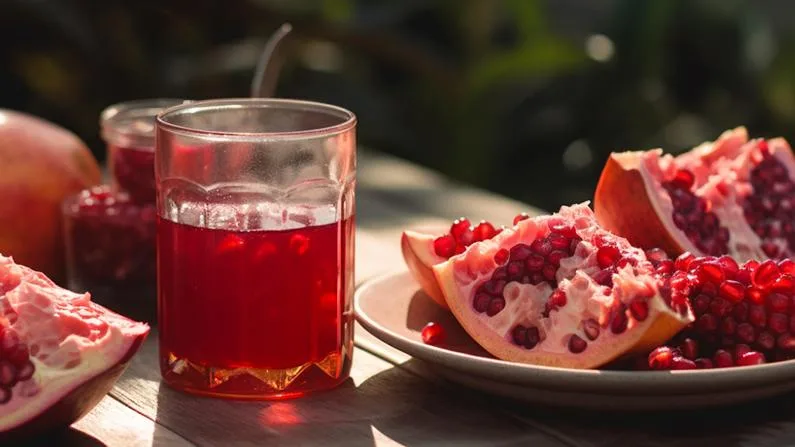
Making juice or buying bottled pomegranate juice are popular choices. You can enjoy fresh fruit or process it into juice or wine, or mix it into a cocktail. Many Western countries process the fruit into pomegranate juice concentrate and export it worldwide.
To find the best pomegranate, look for a fruit that is deep and vibrant in color, ridged in shape, firm, and heavy. This juicy fruit is super versatile. You can keep whole pomegranates at room temperature or refrigerate them for up to two months.
Summary
Below, you’ll find some key highlights from our Pomegranate 101:
- Pomegranates are low in calories and fat and high in fiber, minerals, vitamins, and antioxidants—especially punicalagin.
- Pomegranate has been used for centuries in traditional medicine and can lower your risk of certain cancers and infections.
- They’ve also been shown to be good for heart, urinary, brain, muscle, digestive, and prostate health.
- Look for fruit that is deep and vibrant in color and ridged in shape.
- Pomegranates are generally safe to eat. Some may experience digestive problems or allergic reactions.
- It’s important to consult a healthcare professional if you take certain medications.
Have you ever tried adding pomegranate seeds to your meals for a unique twist? Give it a try today, or share your thoughts in the comments below.





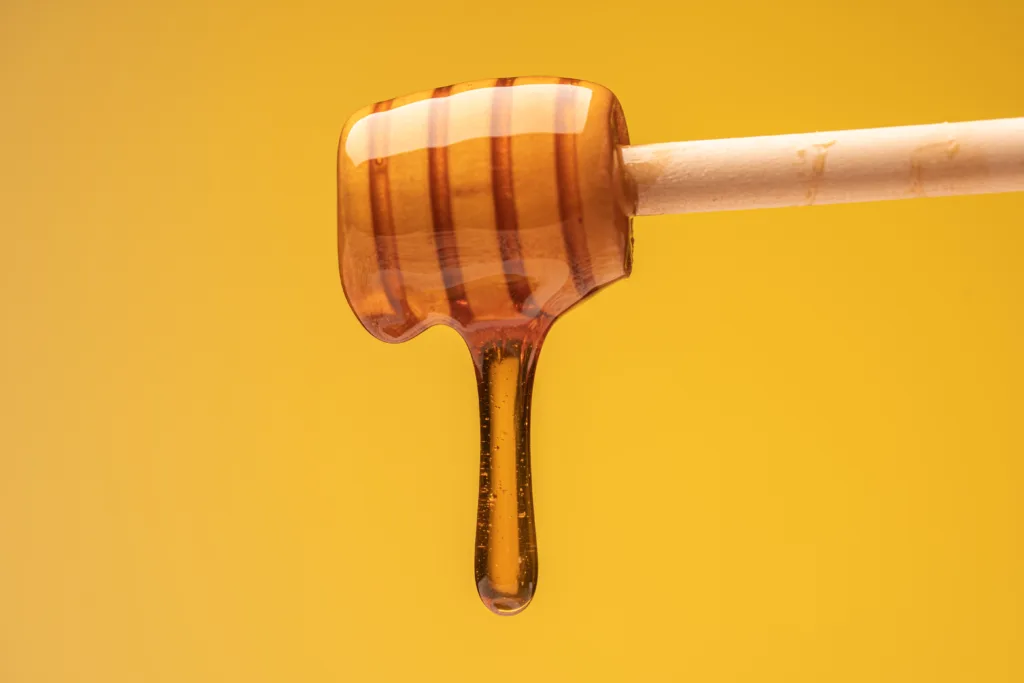


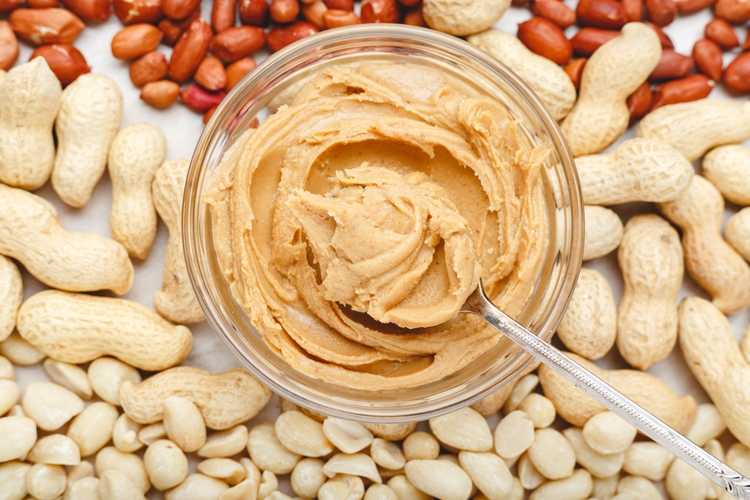






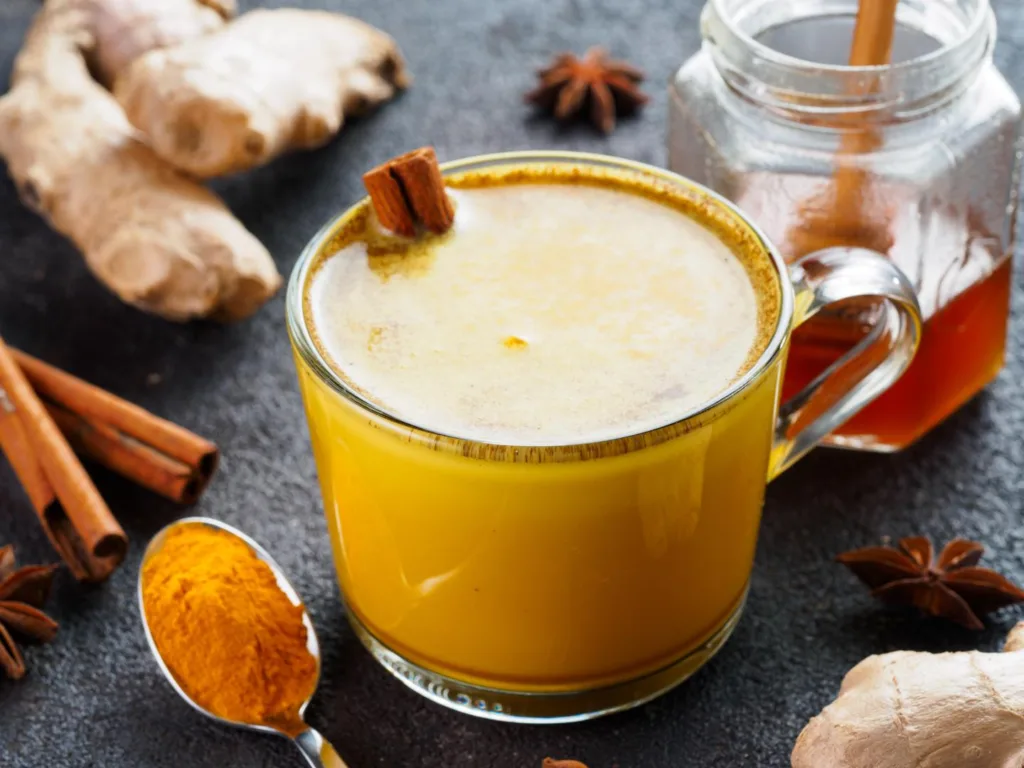

Comments
0